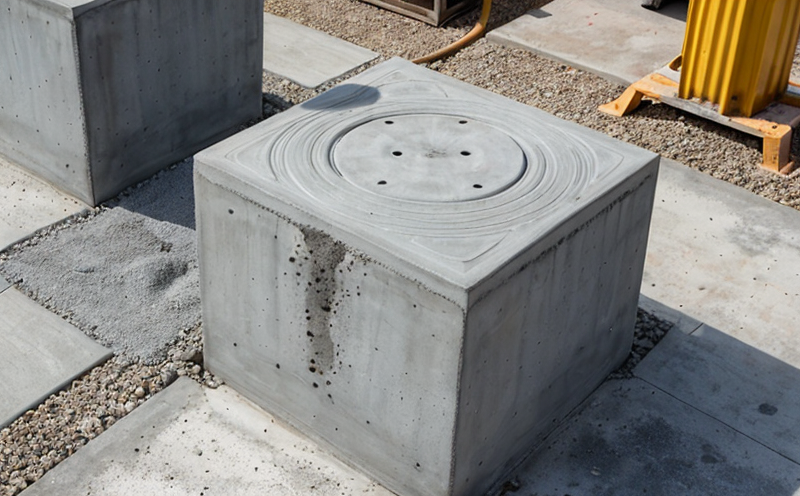EN 196 – Cement Setting Time and Soundness Testing
The European Standard EN 196 is a critical part of the cement testing process, ensuring that cement meets the required quality standards before it is used in construction projects. This standard specifies methods for determining both the initial setting time and final setting time as well as soundness checks on cement paste or mortar samples.
The initial setting time refers to the moment when the mixture begins to lose its plasticity, while the final setting time indicates when the sample has reached a state that allows it to bear significant weight without deformation. These parameters are essential for ensuring proper workability and strength development during concrete production. Properly conducted tests help prevent issues such as premature hardening which can lead to substandard products.
Soundness testing assesses whether or not excessive expansion or contraction occurs due to chemical changes within the cement paste over time, which could result in cracking or crumbling of the final product. This aspect is particularly important for ensuring long-term durability and reliability of structures constructed with this material.
The standard also provides guidance on preparing appropriate specimens according to specific dimensions laid out by EN 196 itself. Specimens should be kept under controlled conditions until their respective setting times are reached, after which they undergo further assessment based on defined criteria.
For accurate results, specialized equipment like automatic setting time testers and soundness apparatuses must be utilized. These tools provide precise measurements necessary for compliance with EN 196 requirements. Additionally, experienced personnel trained in handling these devices ensure consistent and reliable outcomes throughout the testing process.
Incorporating EN 196 into your quality assurance protocols guarantees adherence to recognized international standards, thereby enhancing confidence among stakeholders regarding product integrity. By ensuring that cement sets correctly and remains stable post-setting, you contribute not only to building safer structures but also towards sustainable practices by reducing waste associated with rework or failures.
Our laboratory adheres strictly to the procedures outlined in EN 196, providing accurate results through rigorous testing methods. We employ state-of-the-art equipment and highly skilled technicians capable of delivering reliable data needed for informed decision-making throughout your project lifecycle.
Quality and Reliability Assurance
To ensure high-quality outcomes, our laboratory strictly follows all applicable standards including EN 196 when performing cement setting time and soundness tests. By adhering to these protocols, we guarantee that every test result is accurate and reliable.
- Our team of experts uses advanced technology and precision equipment to conduct each analysis meticulously.
- We maintain strict quality control measures at all stages of the testing process.
- Data integrity is prioritized through thorough documentation and verification procedures.
- Regular calibration and maintenance of our instruments ensure consistent performance over time.
The reliability of our services extends beyond just meeting regulatory requirements; we strive to exceed expectations by offering timely, transparent communication regarding the status of your samples. Our goal is to provide you with peace-of-mind knowing that your materials have been thoroughly vetted and approved according to industry best practices.
By choosing us as your partner in quality assurance, you benefit from a comprehensive approach that encompasses not only compliance but also continuous improvement based on feedback received from clients like yourself. With decades of experience behind our team, we bring unparalleled expertise to every project we undertake.
Environmental and Sustainability Contributions
The importance of sustainability cannot be overstated in today’s construction industry. Ensuring that cement meets the stringent quality standards set forth by EN 196 not only enhances structural integrity but also plays a key role in promoting environmental responsibility.
- By adhering to these standards, we minimize waste and avoid unnecessary rework caused by poor setting times or unsound materials.
- Cement that passes the rigorous tests outlined in EN 196 is more likely to contribute positively to sustainable building practices.
- Our adherence helps reduce carbon footprint associated with substandard products requiring additional resources for correction.
Incorporating sustainable practices into every aspect of our operations—from specimen preparation to final analysis—we aim to lead by example within the sector. Through rigorous testing, we ensure that only high-quality cement is used in construction projects, ultimately leading to more durable and environmentally friendly structures.
Competitive Advantage and Market Impact
Compliance with EN 196 provides significant advantages for businesses operating within the building & infrastructure sector. Here are some key points highlighting why this standard is crucial:
- It ensures consistent quality across all batches of cement, reducing variability in project outcomes.
- Adherence to international standards like EN 196 builds trust among clients and stakeholders who value reliability and precision.
- Clients seeking ISO certification for their companies may find our EN 196-compliant testing beneficial as it supports overall compliance efforts.
In today’s competitive market, having a reputation for delivering accurate, reliable results can set you apart from competitors. By incorporating this standard into your procurement processes or quality assurance programs, you demonstrate commitment to excellence and innovation in materials science.





